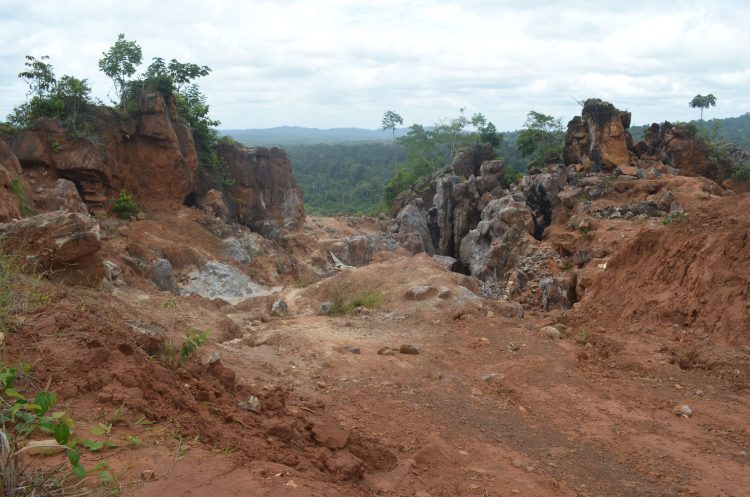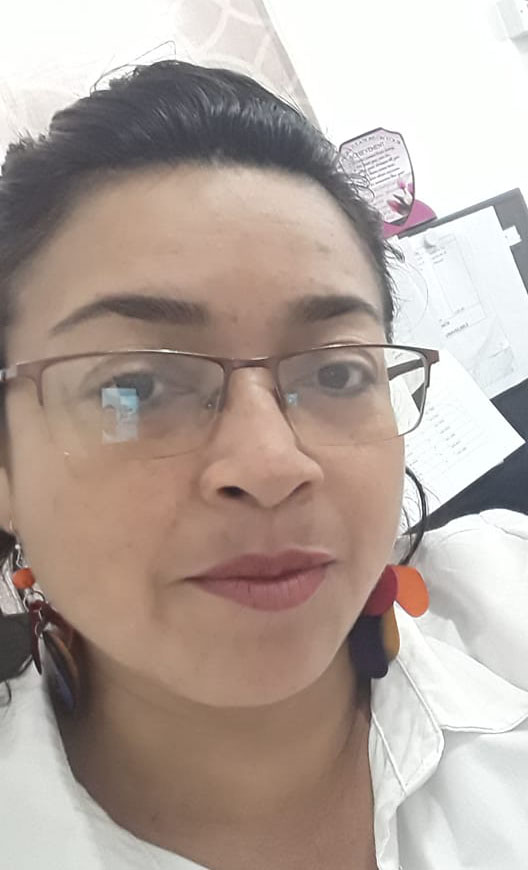The World Wildlife Fund-Guianas and the Amerindian Peoples Association (APA) have expressed concern over the environmental impact that gold mining has had on the Marudi mountain range in Region Nine and are calling for more responsible mining practices to be implemented.
The Marudi Mountains are located in the South Rupununi in Region Nine, and are just one of a few areas in the Rupununi where gold mining activities occur.
A recent visit to Marudi by Stabroek News revealed that gold mining activities in the area have caused damage to the environment with several creeks and their ecosystems totally destroyed. The Mazoa Mountain, located within the Marudi mountain range, has also seen significant changes with its peak completely flattened after a 2016 gold rush. The Locust Creek was the latest to have been completely destroyed by mining activities in the area.
The mining activities over the years have eaten away a vast portion of the land, destroying not only the environment but the cultural significance of the area to the Wapichan Nation, one of three Indigenous tribes that occupy surrounding lands.
When contacted regarding the issue, the WWF expressed concern at the issue and pointed out that the gold mining has been recognised in Guyana as one of the main drivers of deforestation. WWF said that their position continues to be that gold mining should be carried out in a responsible manner using best practices to manage as well as mitigate the environmental and social impacts.
“This is particularly important for surrounding communities. Responsible gold mining should mean avoidance of sensitive areas such as sources of key river systems which is the case in the Southern Rupununi, and especially where people source their water and food. We recognise that this is a land-use activity that negatively impacts the environment, removes forest cover, and often pollutes freshwater systems including impacts on human health due to indiscriminate use of mercury,” WWF stated when contacted by Stabroek News.

Meanwhile APA’s Governance and Rights Coordinator Laura George said that the impact that mining has had in Marudi and surrounding indigenous communities is saddening and extremely alarming but noted that the level of destruction occurring at Marudi is happening all over Guyana but it is hardly highlighted.
She disclosed that she visited Marudi in 2012 and was fortunate to witness Mazoa in its full glory. “I was in awe,” she recalled. Unfortunately, George said, she also knows the state the mountain is in now, which she said, is sad and alarming.
George posited that the negative environmental impact that mining has had in Marudi shows that the political administrations have been failing Guyana when it comes to protecting the environment and by extension, human rights. She noted that contaminated water systems are being used by persons who live close to mining areas and this is a direct violation of not only human rights but the rights of the Indigenous Peoples who are the main occupiers of the hinterland areas in Guyana. Further, she said, Guyana has endorsed so many international declarations and has even signed on to the Minamata Convention but it seems nothing is being done to stand by those declarations.
She said that while she is aware that mining is the livelihood of many persons across Guyana, more needs to be done to ensure that the environment is protected. ‘But this type of destruction is not only happening in Mazoa but is happening all over.”
“There needs to be better mining practices so that we can have a better approach, it is important for Guyana to ensure that we protect our environment and it is important for our human survival and not only for Indigenous Peoples but for everyone,” she added.
The Coordinator noted that she is aware Wapichan leaders from the South Rupununi have raised concerns on mining activities in Marudi, given that their waterways are interconnected, but not much has been done by the government to address some of these concerns.
Workable solutions
However, while acknowledging that the mining is a livelihood for many, George said it is imperative that the relevant government agencies find workable solutions to ensure that negative mining impacts are minimised.
One way this can be done, she suggested, is to ensure that Free Prior and Informed Consent of the Indigenous Peoples is recognised. If this is done, she contended, many of the issues that are common today in the hinterland (which are not limited to mining activities) can be solved. Part of the role of the APA, she explained, is to advocate for Indigenous rights to be recognised and it is with this in mind that they have been pushing for more consultation, especially where it involves mining activities as this is one of the major issues currently faced by the Indigenous Peoples in Guyana.
George pointed out that the Indigenous Peoples in Guyana depend heavily on the environment for water or food which is why consultations with them are important. “Mining in a particular area could be a water source. It might be sacred lands or important heritage and cultural sites to our people. We don’t want them to be destroyed.”
She added that environmental issues in Marudi should not be of concern to the South Rupununi District Council alone because ultimately everyone will be affected if proper systems are not in place to mitigate the harmful impacts of mining. “As I said this approach to mining, this disregard to the rights of the Indigenous Peoples, the disregard to protection of the environment and our eco system is something that is happening all around.”
Major deforestation can be found in the Marudi and Toucan mountains. While small trees are now beginning to reclaim the land destroyed by mining activities, other areas remain bare and desolate with little hope for forest recovery.
The environmental impacts have resulted in significant destruction to wildlife habitats, healthy forests, clean creeks and rivers, and contaminated the air.
In April of 2019, the then Ministry of Natural Resources had declared that contrary to claims, Minister of Natural Resources Raphael Trotman did not give permission to any miner to conduct mining operations on Mazoa. There were enforcement operations around that period in the Marudi Mountains to remove illegal miners. It is unclear what steps have been taken since then by the authorities to protect the area from indiscriminate mining.
Several calls to the Ministry of Natural Resources as well as the Environmental Protection Agency for a comment on the issue were unanswered.






